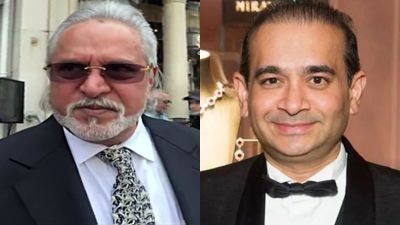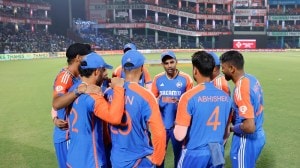UPSC Essentials — Daily Subject-wise quiz : History, Culture, and Social Issues (Week 13)
Are you preparing for UPSC CSE Prelims 2024? Check your progress and revise your topics through this quiz on History, Culture and Social Issues.
 Brush up your knowledge of History, Culture and Social Issues by solving the MCQs. Here is the image of tile with Ajivaka ascetics (Source: Los Angeles County Museum of Art/Wikimedia Commons)
Brush up your knowledge of History, Culture and Social Issues by solving the MCQs. Here is the image of tile with Ajivaka ascetics (Source: Los Angeles County Museum of Art/Wikimedia Commons) 🚨 This story is part of our special initiative for UPSC and other competitive exams. Look out for UPSC KEY on weekdays and UPSC Essentials everyday, Weekly news express with MCQs, Key Terms of the past week, Quizzes as well as The Indian Express 360° Upsc Debate, Society & Social Justice, UPSC Mains Practice, Art and Culture with Devdutt Pattanaik, UPSC Ethics Simplified, Experts Talk, and more. 🚨
Dear Aspirants,
Every day we receive your emails and messages, in large numbers, with queries revolving around news and UPSC preparation in general. Each letter and text makes us feel that we need to do more to make your journey for examination preparation simpler. Therefore, we have decided to interact with you Live! Let’s take your queries and provide you with cues from the news you need to know for UPSC Exams.
The popular question for the coming week: How to make the best use of The Indian Express newspaper for UPSC CSE? and more…
You can send me your queries at manas.srivastava@indianexpress.com or join Telegram: The Indian Express UPSC Hub or ask me Live! @ 8 PM, July, 5.
UPSC Essentials brings to you its initiative of subject-wise quizzes. UPSC Daily Subject Quiz will cover all topics under UPSC Civil Services syllabus like Polity, History, Geography, Economics, Environment, Science and Technology, International Relations, and more. These quizzes are designed to help you revise some of the most important topics from the static part of the syllabus.
Each day, we will cover one new subject. Attempt today’s subject quiz on History, Culture and Social Issues to check your progress. Come back tomorrow to solve the MCQs on Environment, Geography, Science and Technology. Don’t miss checking the answers and explanations at the end of the quiz.
QUESTION 1
Consider the following:
1. Majma-ul-Bahrain
2. Sirr-i-Akbar
Which of the above is/are work(s) of Dara Shikoh?
(a) 1 only
(b) 2 only
(c) Both 1 and 2
(d) Neither 1 nor 2
QUESTION 2
With reference to the Ajivika sect, consider the following statements:
1. The central belief of the sect was that absolutely everything is predetermined by fate.
2. Ajiviks used to wear white clothes and lived in organised groups.
3. The sect reached its peak during the Mauryan Emperor Bindusara’s time.
How many of the above statements are correct?
(a) Only one
(b) Only two
(c) All three
(d) None
QUESTION 3
With reference to Suketi fossil park, consider the following statements:
1. The fossils of pre-historic animals were excavated from the park.
2. The park is located in the central highlands of India.
Which of the statement(s) given above is/are correct?
(a) 1 only
(b) 2 only
(c) Both 1 and 2
(d) Neither 1 nor 2
QUESTION 4
This semi-precious stone is found in underground mines of Rajpipla and Ratanpur in riverbeds, and extracted to produce a variety of ornamental objects. Recently, the Prime Minister of India presented a bowl made of this semi-precious stone to the leaders of G20 countries.
The semi-precious stone mentioned above is:
(a) emerald
(b) agate
(c) sapphire
(d) lapis lazuli
QUESTION 5
Kandhamal Haladi has got a Geographical Indication (GI) tag from which state?
(a) Odisha
(b) Karnataka
(c) Meghalaya
(d) Tamil Nadu
ANSWER TO MCQs
1. (c)
FYI:
— Dara Shikoh is one of India’s most enlightened thinkers. He was a champion of interfaith understanding, philosopher, artist, architect, translator, poet and administrator.
— In 1655 his father and Mughal emperor Shah Jahan declared him the Crown Prince, he was assassinated by his younger brother, Aurangzeb.
— Dara Shikoh, who had a deep understanding and knowledge of major religions, particularly Islam and Hinduism, is known as a pioneer of the academic movement for interfaith understanding in India.
— His most important works, Majma-ul-Bahrain (Mingling of Two Oceans) and Sirr-i-Akbar (Great Mystery), are devoted to the cause of establishing connections between Hinduism and Islam.
Therefore, option (c) is the correct answer.
2. (b)
FYI:
— Around the 6th century BC, at the time of the Buddha, there was an explosion all across India of different schools of thought and philosophy.
— One of the most popular was the Ajivika sect. Though it had been around for ages, its most important leader Makkhali Goshala was a contemporary of both the Buddha and Mahavira.
— The Ajivikas’ central belief was that absolutely everything is predetermined by fate, or niyati, and hence human action has no consequence one way or the other. According to them, each soul’s course was like a ball of thread that is unravelling. Hence, statement 1 is correct.
— Ajiviks wore no clothes, and lived as ascetic monks in organised groups. They were known to practice extremely severe austerities, such as lying on nails, going through fire, exposing themselves to extreme weather, and even spending time in large earthen pots for penance. Hence, statement 2 is not correct.
— There was no caste discrimination and people from all walks of life joined them. Interestingly, the oldest rock-cut caves in India, the Barabar Caves in Bihar dating from the Mauryan Empire, were made for Ajiviks and Jains to retreat and meditate.
— Ajiviks were quite influential, and had many powerful followers. The sect reached its peak during the Mauryan Emperor Ashoka’s father’s (Bindusara’s) time. Hence, statement 3 is correct.
Therefore, option (b) is the correct answer.
3. (a)
FYI:
— The site, suketi is situated near Jagjitnagar in Kasauli, on the foothills of the Shivalik ranges where tree fossils claimed to be approximately 25 million years old were found. Hence, statement 2 is not correct.
— The fossils of animal has been excavated which were believed to be from pre-historic times. Hence, statement 1 is correct.
— The park displays life-size models of these extinct animals like a grand elephant,a hippopotamus with six incisors,giant land tortoise,a sabre- toothed tiger and a crocodile.
Therefore, option (a) is the correct answer.
4. (b)
FYI:
— At the G20 summit, Prime Minister Narendra Modi gifted heads of states curated craft pieces from Gujarat and Himachal Pradesh.
— Agate bowls from Kutch were presented to the leaders of France, Germany and Singapore.
— The semi-precious stone is found in underground mines of Rajpipla and Ratanpur in riverbeds, and extracted to produce a variety of ornamental objects.
Therefore, option (b) is the correct answer.
5. (a)
FYI:
— Kandhamal Haladi is part of the ginger family of herbs, Zingiberaceae. Its botanical name is Curcuma Longa.
— All curcumas are perennial plants native to southern Asia and require temperatures between 20 and 30°C (68–86°F) and a considerable amount of annual rainfall to thrive.
— Kandhamal is the centrally located District of Odisha pre dominantly in habituated by SC and ST population about 60 per cent of the geographical area is hilly and with forest cover.
Therefore, option (a) is the correct answer.
(Source: search.ipindia.gov.in)
New initiative for UPSC Mains
UPSC CSE Mains 2023 season has begun. Are you ready for it? UPSC Essentials brings to you its new initiative for the practice of Mains answer writing. Mains Answer Writing will cover essential topics of static and dynamic parts of the UPSC Civil Services syllabus covered under various GS papers. This answer-writing practice is designed to help you as a value addition to your UPSC CSE Mains. Try it out!
UPSC Essentials: Mains answer practice — GS 1 (Week 1)
UPSC Essentials: Mains answer practice — GS 1 (Week 2)
UPSC Essentials: Mains answer practice — GS 1 (Week 3)
UPSC Essentials: Mains answer practice — GS 1 (Week 4)
UPSC Essentials: Mains answer practice — GS 1 (Week 5)
UPSC Essentials: Mains answer practice — GS 2 (Week 1)
UPSC Essentials: Mains answer practice — GS 2 (Week 2)
UPSC Essentials: Mains answer practice — GS 2 (Week 3)
UPSC Essentials: Mains answer practice — GS 2 (Week 5)
UPSC Essentials: Mains answer practice — GS 3 (Week 2)
UPSC Essentials: Mains answer practice — GS 3 (Week 3)
UPSC Essentials: Mains answer practice — GS 3 (Week 4)
UPSC Essentials: Mains answer practice — GS 3 (Week 5)
UPSC Essentials: Mains answer practice — GS 3 (Week 5)
UPSC Essentials: Mains answer practice — GS 3 (Week 5)
UPSC Essentials: Mains answer practice — GS 3 (Week 5)
UPSC Essentials: Mains answer practice — GS 3 (Week 5)
UPSC Essentials: Mains answer practice — GS 3 (Week 5)
UPSC Essentials: Mains answer practice — GS 3 (Week 6)
UPSC Essentials: Mains answer practice — GS 4 (Week 2)
UPSC Essentials: Mains answer practice — GS 4 (Week 3)
UPSC Essentials: Mains answer practice — GS 4 (Week 5)
The UPSC Essentials Indian Express is now on Telegram- Indian Express UPSC Hub. Click here to join our YouTube channel and stay updated with the latest updates.
Note: Catch the UPSC Weekly Quiz every Saturday evening and brush up on your current affairs knowledge.)
Photos





- 01
- 02
- 03
- 04
- 05


























